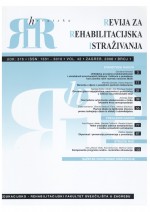Komponente programa oralno-motoričke stimulacije
Components of oral-motor stimulation program
Author(s): Ines Joković Oreb, Ana Antunović, Martina CelizićSubject(s): Education, Inclusive Education / Inclusion
Published by: Sveučilište u Zagrebu, Edukacijsko-rehabilitacijski fakultet
Keywords: oralfacial stimulation; oral awereness; oral motor control; sensory defensiveness; infant care;
Summary/Abstract: The main goal of this paper is to point out complex feeding process of infant from the perspective of professional achivment within Cabinet for early psychomotoric stimulation of the Center for Rehabilitation on Faculty of Education and Rehabilitation Sciences in Zagreb and Little House - Day care cnter for rehabilitation and occupational therapy for visually impaired children with multiple disabilities. Feeding of the child is not only the biological answer on baby’s metabolic demands, but it is complex network of behaviours, which is involved in actions and reactions of others from surrounding.In therapeutic process, which respect differences, promote collectiveness and share knowledge and experience, active involvement of the infant and the parents must be provide. In premature children, as in children with neurological problems, the stimulation of oral motoric abilities precede to the process of feeding, what will be present in this work. Oralfacial activities stimulate child’s face and mouth. They present the technique by which we can improve oral-motor control, frequency of swalowing and sensory awareness. They are used just before and during meals so that child can be as active as much as it can. These simple activities include touching, wiping and tapping techniques. Using them we can help child to use his mouth functionaly and to strentgh its oral skills, which are important for eating as for speech and facial expression development. Because they stimulate preverbal skills, which are basis for development of eating skills and for further development of articulation, they are important part of early intervention programme.
Journal: Hrvatska revija za rehabilitacijska istrazivanja
- Issue Year: 41/2006
- Issue No: 1
- Page Range: 105-112
- Page Count: 8
- Language: Croatian

